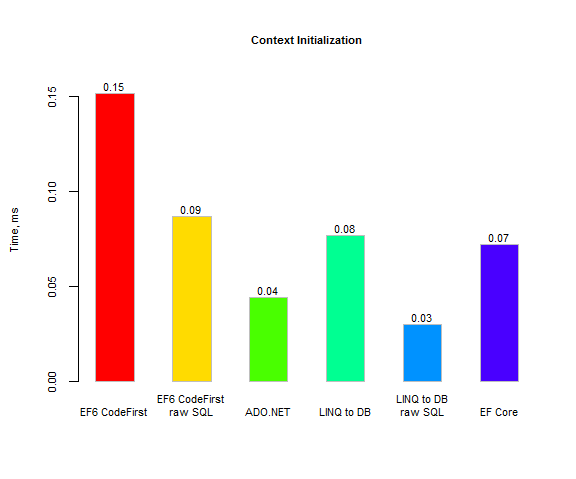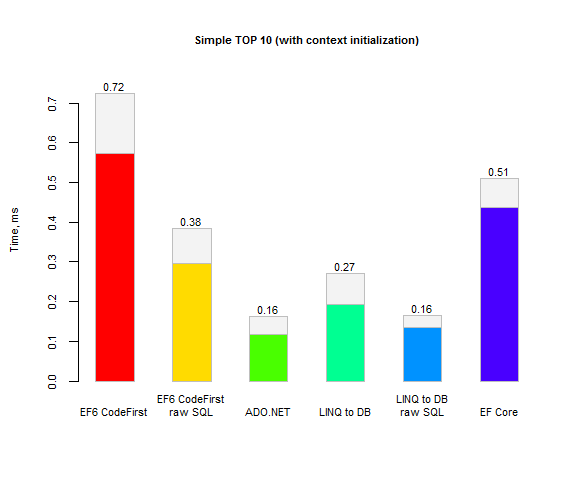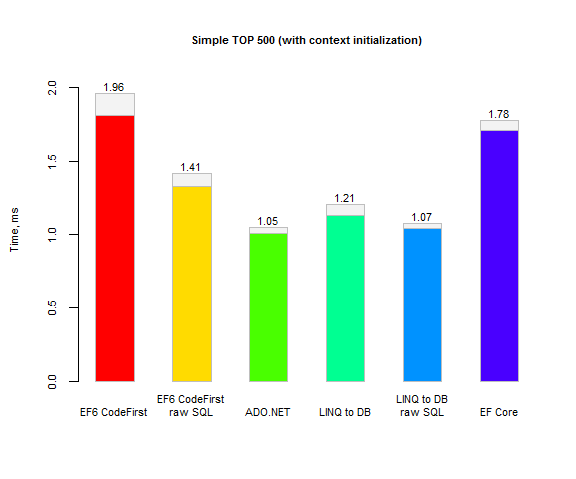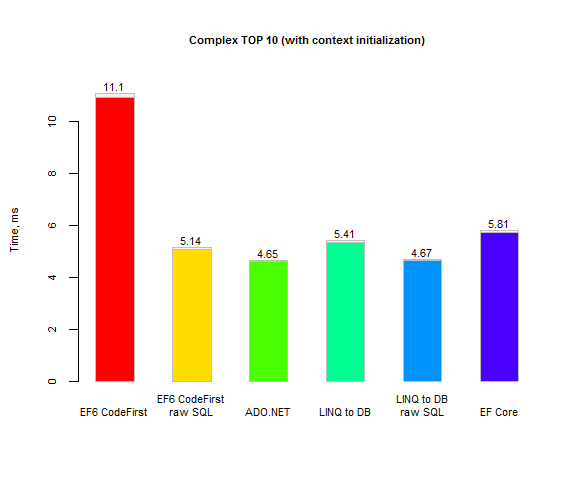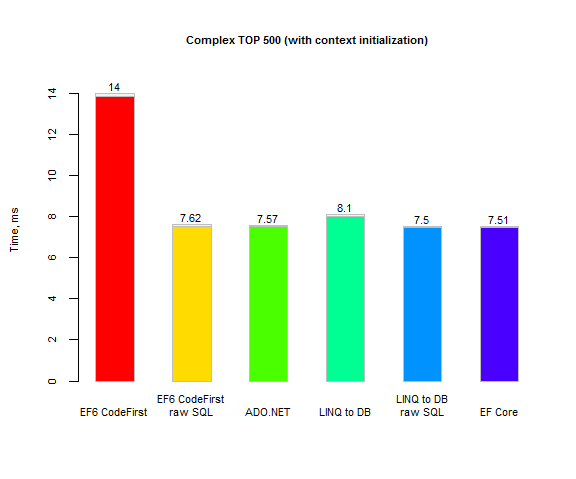Performance of reflection and compiled expressions will be shown in this post.
There's a nice library ObjectListView which has lots of features, and also easy to use. Because it's not need to fill ListViewItem manually.
For User class:
class User
{
public int Id;
public string Name;
public DateTime BirthDate;
}
instead of this code:
var lvis = new List<ListViewItem>();
foreach (var user in users)
{
lvis.Add(new ListViewItem(new[]
{
user.Id.ToString(),
user.Name,
user.BirthDate.ToString(),
}));
}
you can simply pass collection of your own classes:
objectListView.Objects = users;
This library is an example of where reflection can be used.
But what should be used - reflection, or compiled expressions, or emit? The following tests will show. Except emit - it won't be tested because it's difficult to use it. Assumption about emit can be made looking on manual (speed) and compiled expression (startup overhead) tests.
Three tests will be made:
- Manual.
- Reflection.
- Compiled expression.
Each test consists of 200 iteration for warmup and 200 iterations for test itself.
Every test creates list of ListViewItem for specified object type. Except manual test which is only for User type.
Hardware: i5-4200H, DDR3-1600, Win 10 x64 1607. Software: VS 2015, .NET 4.6.1.
Code for manual test:
public static List<ListViewItem> CreateListItemsManual(List<User> users)
{
var items = new List<ListViewItem>();
foreach (var user in users)
{
var subitems = new[]
{
user.Id.ToString(),
user.Name,
user.BirthDate.ToString("dd.MM.yyyy (ddd)"),
};
var lvi = new ListViewItem(subitems);
items.Add(lvi);
}
return items;
}
Code for reflection test:
public static List<ListViewItem> CreateListItemsReflection(Type type, IEnumerable<object> users)
{
var items = new List<ListViewItem>();
var fields = type.GetFields();
foreach (var user in users)
{
var subitems = new string[fields.Length];
for (int i = 0; i < fields.Length; i++)
{
string value;
var field = fields[i];
if (field.FieldType == typeof(string))
{
value = (string)field.GetValue(user);
}
else if (field.FieldType == typeof(int))
{
value = ((int)field.GetValue(user)).ToString();
}
else if (field.FieldType == typeof(DateTime))
{
value = ((DateTime)field.GetValue(user)).ToString("dd.MM.yyyy (ddd)");
}
else
{
value = field.GetValue(user).ToString();
}
subitems[i] = value;
}
var lvi = new ListViewItem(subitems);
items.Add(lvi);
}
return items;
}
Code for compiled expression test:
public static List<ListViewItem> CreateListItemsCompiledExpression(Type type, IEnumerable<object> users)
{
var items = new List<ListViewItem>();
var fields = type.GetFields();
Func<object, string>[] fieldGetters = new Func<object, string>[fields.Length];
for (int i = 0; i < fields.Length; i++)
{
Func<object, string> fieldGetter;
Expression<Func<object, string>> lambda;
var field = fields[i];
// user =>
var userObject = Expression.Parameter(typeof(object), "user");
// user => (User)user
var user = Expression.Convert(userObject, type);
// user => ((User)user)."Field"
var fld = Expression.Field(user, field);
if (field.FieldType == typeof(string))
{
// user => ((User)user)."Field"
lambda = Expression.Lambda<Func<object, string>>(fld, userObject);
}
else if (field.FieldType == typeof(int))
{
// user => ((User)user)."Field".ToString() // int.ToString()
var toString = Expression.Call(fld, typeof(int).GetMethod("ToString", new Type[0]));
lambda = Expression.Lambda<Func<object, string>>(toString, userObject);
}
else if (field.FieldType == typeof(DateTime))
{
// user => ((User)user)."Field".ToString("dd.MM.yyyy (ddd)")
var toString = Expression.Call(
fld,
typeof(DateTime).GetMethod("ToString", new Type[] { typeof(string) }),
Expression.Constant("dd.MM.yyyy (ddd)"));
lambda = Expression.Lambda<Func<object, string>>(toString, userObject);
}
else
{
// user => ((User)user)."Field".ToString() // object.ToString()
var toString = Expression.Call(fld, typeof(object).GetMethod("ToString", new Type[0]));
lambda = Expression.Lambda<Func<object, string>>(toString, userObject);
}
fieldGetter = lambda.Compile();
fieldGetters[i] = fieldGetter;
}
foreach (var user in users)
{
var subitems = new string[fields.Length];
for (int i = 0; i < fields.Length; i++)
{
subitems[i] = fieldGetters[i](user);
}
var lvi = new ListViewItem(subitems);
items.Add(lvi);
}
return items;
}
Results

There's no much difference in absolute time for case with not many items - ~0.5 ms. This time is startup overhead for expressions compilation. It doesn't make sense for UI - nobody can see 0.5 ms difference.
Let's see the whole graph below.

Reflection is slower for about 6-7 ms for 20,000 elements. Again, this is not the time that anyone can see in UI.
But what should be used in real life projects? Is it worth to write code for universal and simple usage using reflection/expression, or it's better to spend time and write specific code for every type manually to achieve best performance for both little and many elements?
For UI components, if it's definitely known that there won't be many elements, reflection can be used.
But what if it's server application and/or there can be cases with both little and many elements, and/or performance is required? Already for 100-200 elements first graph shows ~1.5x performance difference between manual and reflection methods.
Fortunately, in real applications used types are not being changed all the time while program runs. This means that once expressions are compiled they can be cached.
This way allows to use compiled expressions without startup overhead.
